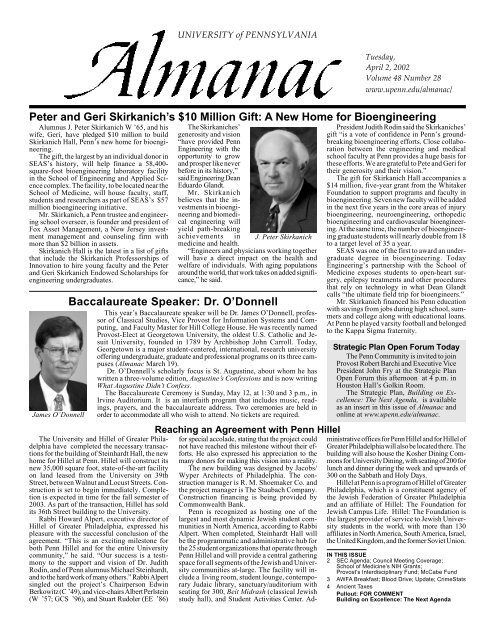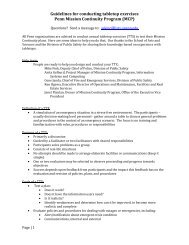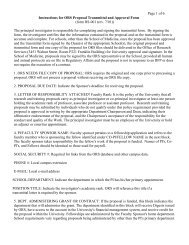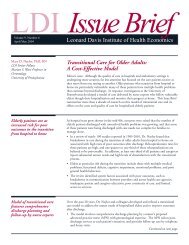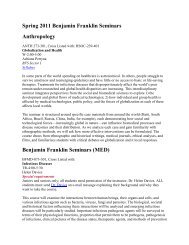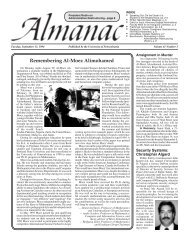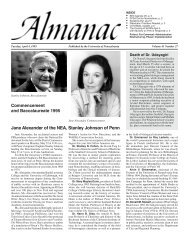Dr. O'Donnell - University of Pennsylvania
Dr. O'Donnell - University of Pennsylvania
Dr. O'Donnell - University of Pennsylvania
You also want an ePaper? Increase the reach of your titles
YUMPU automatically turns print PDFs into web optimized ePapers that Google loves.
UNIVERSITY <strong>of</strong> PENNSYLVANIA<br />
Tuesday,<br />
April 2, 2002<br />
Volume 48 Number 28<br />
www.upenn.edu/almanac/<br />
Peter and Geri Skirkanich’s $10 Million Gift: A New Home for Bioengineering<br />
Alumnus J. Peter Skirkanich W ’65, and his<br />
wife, Geri, have pledged $10 million to build<br />
Skirkanich Hall, Penn’s new home for bioengineering.<br />
The gift, the largest by an individual donor in<br />
SEAS’s history, will help finance a 58,400-<br />
square-foot bioengineering laboratory facility<br />
in the School <strong>of</strong> Engineering and Applied Science<br />
complex. The facility, to be located near the<br />
School <strong>of</strong> Medicine, will house faculty, staff,<br />
students and researchers as part <strong>of</strong> SEAS’s $57<br />
million bioengineering initiative.<br />
Mr. Skirkanich, a Penn trustee and engineering<br />
school overseer, is founder and president <strong>of</strong><br />
Fox Asset Management, a New Jersey investment<br />
management and counseling firm with<br />
more than $2 billion in assets.<br />
Skirkanich Hall is the latest in a list <strong>of</strong> gifts<br />
that include the Skirkanich Pr<strong>of</strong>essorships <strong>of</strong><br />
Innovation to hire young faculty and the Peter<br />
and Geri Skirkanich Endowed Scholarships for<br />
engineering undergraduates.<br />
The <strong>University</strong> and Hillel <strong>of</strong> Greater Philadelphia<br />
have completed the necessary transactions<br />
for the building <strong>of</strong> Steinhardt Hall, the new<br />
home for Hillel at Penn. Hillel will construct its<br />
new 35,000 square foot, state-<strong>of</strong>-the-art facility<br />
on land leased from the <strong>University</strong> on 39th<br />
Street, between Walnut and Locust Streets. Construction<br />
is set to begin immediately. Completion<br />
is expected in time for the fall semester <strong>of</strong><br />
2003. As part <strong>of</strong> the transaction, Hillel has sold<br />
its 36th Street building to the <strong>University</strong>.<br />
Rabbi Howard Alpert, executive director <strong>of</strong><br />
Hillel <strong>of</strong> Greater Philadelphia, expressed his<br />
pleasure with the successful conclusion <strong>of</strong> the<br />
agreement. “This is an exciting milestone for<br />
both Penn Hillel and for the entire <strong>University</strong><br />
community,” he said. “Our success is a testimony<br />
to the support and vision <strong>of</strong> <strong>Dr</strong>. Judith<br />
Rodin, and <strong>of</strong> Penn alumnus Michael Steinhardt,<br />
and to the hard work <strong>of</strong> many others.” Rabbi Alpert<br />
singled out the project’s Chairperson Edwin<br />
Berkowitz (C ’49), and vice-chairs Albert Perlstein<br />
(W ’57; GCS ’96), and Stuart Rudoler (EE ’86)<br />
The Skirkaniches’<br />
generosity and vision<br />
“have provided Penn<br />
Engineering with the<br />
opportunity to grow<br />
and prosper like never<br />
before in its history,”<br />
said Engineering Dean<br />
Eduardo Glandt.<br />
Mr. Skirkanich<br />
believes that the investments<br />
in bioengineering<br />
and biomedical<br />
engineering will<br />
yield path-breaking<br />
achievements in J. Peter Skirkanich<br />
medicine and health.<br />
“Engineers and physicians working together<br />
will have a direct impact on the health and<br />
welfare <strong>of</strong> individuals. With aging populations<br />
around the world, that work takes on added significance,”<br />
he said.<br />
Baccalaureate Speaker: <strong>Dr</strong>. O’Donnell<br />
This year’s Baccalaureate speaker will be <strong>Dr</strong>. James O’Donnell, pr<strong>of</strong>essor<br />
<strong>of</strong> Classical Studies, Vice Provost for Information Systems and Computing,<br />
and Faculty Master for Hill College House. He was recently named<br />
Provost-Elect at Georgetown <strong>University</strong>, the oldest U.S. Catholic and Jesuit<br />
<strong>University</strong>, founded in 1789 by Archbishop John Carroll. Today,<br />
Georgetown is a major student-centered, international, research university<br />
<strong>of</strong>fering undergraduate, graduate and pr<strong>of</strong>essional programs on its three campuses<br />
(Almanac March 19).<br />
<strong>Dr</strong>. O’Donnell’s scholarly focus is St. Augustine, about whom he has<br />
written a three-volume edition, Augustine’s Confessions and is now writing<br />
What Augustine Didn’t Confess.<br />
The Baccalaureate Ceremony is Sunday, May 12, at 1:30 and 3 p.m., in<br />
Irvine Auditorium. It is an interfaith program that includes music, readings,<br />
prayers, and the baccalaureate address. Two ceremonies are held in<br />
James O’Donnell order to accommodate all who wish to attend. No tickets are required.<br />
Reaching an Agreement with Penn Hillel<br />
for special accolade, stating that the project could<br />
not have reached this milestone without their efforts.<br />
He also expressed his appreciation to the<br />
many donors for making this vision into a reality.<br />
The new building was designed by Jacobs/<br />
Wyper Architects <strong>of</strong> Philadelphia. The construction<br />
manager is R. M. Shoemaker Co. and<br />
the project manager is The Staubach Company.<br />
Construction financing is being provided by<br />
Commonwealth Bank.<br />
Penn is recognized as hosting one <strong>of</strong> the<br />
largest and most dynamic Jewish student communities<br />
in North America, according to Rabbi<br />
Alpert. When completed, Steinhardt Hall will<br />
be the programmatic and administrative hub for<br />
the 25 student organizations that operate through<br />
Penn Hillel and will provide a central gathering<br />
space for all segments <strong>of</strong> the Jewish and <strong>University</strong><br />
communities at-large. The facility will include<br />
a living room, student lounge, contemporary<br />
Judaic library, sanctuary/auditorium with<br />
seating for 300, Beit Midrash (classical Jewish<br />
study hall), and Student Activities Center. Ad-<br />
President Judith Rodin said the Skirkaniches’<br />
gift “is a vote <strong>of</strong> confidence in Penn’s groundbreaking<br />
bioengineering efforts. Close collaboration<br />
between the engineering and medical<br />
school faculty at Penn provides a huge basis for<br />
these efforts. We are grateful to Pete and Geri for<br />
their generosity and their vision.”<br />
The gift for Skirkanich Hall accompanies a<br />
$14 million, five-year grant from the Whitaker<br />
Foundation to support programs and faculty in<br />
bioengineering. Seven new faculty will be added<br />
in the next five years in the core areas <strong>of</strong> injury<br />
bioengineering, neuroengineering, orthopedic<br />
bioengineering and cardiovascular bioengineering.<br />
At the same time, the number <strong>of</strong> bioengineering<br />
graduate students will nearly double from 18<br />
to a target level <strong>of</strong> 35 a year.<br />
SEAS was one <strong>of</strong> the first to award an undergraduate<br />
degree in bioengineering. Today<br />
Engineering’s partnership with the School <strong>of</strong><br />
Medicine exposes students to open-heart surgery,<br />
epilepsy treatments and other procedures<br />
that rely on technology in what Dean Glandt<br />
calls “the ultimate field trip for bioengineers.”<br />
Mr. Skirkanich financed his Penn education<br />
with savings from jobs during high school, summers<br />
and college along with educational loans.<br />
At Penn he played varsity football and belonged<br />
to the Kappa Sigma fraternity.<br />
Strategic Plan Open Forum Today<br />
The Penn Community is invited to join<br />
Provost Robert Barchi and Executive Vice<br />
President John Fry at the Strategic Plan<br />
Open Forum this afternoon at 4 p.m. in<br />
Houston Hall’s Golkin Room.<br />
The Strategic Plan, Building on Excellence:<br />
The Next Agenda, is available<br />
as an insert in this issue <strong>of</strong> Almanac and<br />
online at www.upenn.edu/almanac.<br />
ministrative <strong>of</strong>fices for Penn Hillel and for Hillel <strong>of</strong><br />
Greater Philadelphia will also be located there. The<br />
building will also house the Kosher Dining Commons<br />
for <strong>University</strong> Dining, with seating <strong>of</strong> 200 for<br />
lunch and dinner during the week and upwards <strong>of</strong><br />
300 on the Sabbath and Holy Days.<br />
Hillel at Penn is a program <strong>of</strong> Hillel <strong>of</strong> Greater<br />
Philadelphia, which is a constituent agency <strong>of</strong><br />
the Jewish Federation <strong>of</strong> Greater Philadelphia<br />
and an affiliate <strong>of</strong> Hillel: The Foundation for<br />
Jewish Campus Life. Hillel: The Foundation is<br />
the largest provider <strong>of</strong> service to Jewish <strong>University</strong><br />
students in the world, with more than 130<br />
affiliates in North America, South America, Israel,<br />
the United Kingdom, and the former Soviet Union.<br />
IN THIS ISSUE<br />
2 SEC Agenda; Council Meeting Coverage;<br />
School <strong>of</strong> Medicine’s NIH Grants;<br />
Provost’s Interdisciplinary Fund; McCabe Fund<br />
3 AWFA Breakfast; Blood <strong>Dr</strong>ive; Update; CrimeStats<br />
4 Ancient Taxes<br />
Pullout: FOR COMMENT<br />
Building on Excellence: The Next Agenda
SENATE: From the Senate Office<br />
The following agenda is published in<br />
accordance with the Faculty Senate Rules.<br />
Questions may be directed to Carolyn Burdon<br />
either by telephone at (215) 898-6943 or<br />
by e-mail at burdon@pobox.upenn.edu.<br />
Agenda <strong>of</strong> Senate<br />
Executive Committee Meeting<br />
Wednesday, April 3, 2002<br />
3-5:30 p.m.<br />
1. Approval <strong>of</strong> the minutes <strong>of</strong> February 6, 2002<br />
2. Chair’s Report<br />
3. Past Chair’s Report on Academic Planning<br />
and Budget and Capital Council<br />
4. Informal discussion with President Rodin<br />
5. Cost <strong>of</strong> research presentation with Provost<br />
Barchi<br />
6. Other new business<br />
7. Adjournment by 5:30 p.m.<br />
Council Meeting Coverage<br />
At last Wednesday’s <strong>University</strong> Council meeting<br />
there was a presentation on this year’s budget<br />
which will be included in next week’s issue.<br />
Omar Blaik, vice president for facilities, gave<br />
a report on the recent campus developments in<br />
terms <strong>of</strong> the Campus Development Plan (Almanac<br />
February 27, 2001). He noted that street<br />
improvements have included trees: 350 have<br />
been planted with more to come, as well as new<br />
bike and parking lanes along Spruce Street, new<br />
lighting and street repaving. The new banner<br />
program provides a visually consistent identity<br />
as it announces Penn events. He said the city is<br />
pleased with the environmental impact <strong>of</strong> the<br />
additional trees around campus.<br />
Another aspect <strong>of</strong> the plan to be implemented<br />
is public open spaces on campus which include<br />
the extension <strong>of</strong> Woodland Walk through Hill<br />
Field which Mr. Blaik described as “a welcome<br />
intervention” making Penn seem closer to Center<br />
City. A new open space for concerts and other<br />
performances is <strong>University</strong> Square—the former<br />
parking spaces adjacent to the Franklin Building<br />
and the Annex—which is expected to be complete<br />
by commencement weekend. The 300-<br />
space parking lot to the east <strong>of</strong> the Left Bank has<br />
been seeded to be a new green space.<br />
There are several buildings currently under<br />
construction at various stages <strong>of</strong> completion: the<br />
new PreK-8 Penn-assisted School is to be done<br />
in July, Wharton’s Huntsman Hall is expected to<br />
finished this August, Engineering’s Levine Hall<br />
is slated for December, Pottruck Fitness Center<br />
is currently ahead <strong>of</strong> schedule and it is expected<br />
that significant portions <strong>of</strong> it will be ready for<br />
use by September. The Dental School’s Schattner<br />
Center is about 80% complete. The cinema at<br />
40th Street received approval from the Trustees<br />
for the additional funding to complete that project.<br />
Mr. Blaik also noted that the History Department<br />
is back in College Hall although part <strong>of</strong> the<br />
building has not yet been renovated.<br />
VPUL Valarie Swain-Cade McCoullum discussed<br />
the numerous positive interactions between<br />
diverse groups on campus in response to<br />
last year’s Pluralism Committee which made<br />
recommendations (Almanac October 2, 2001).<br />
She said that the collaborative events have “altered<br />
perceptions and experiences” and have<br />
increased in quantity dramatically since last<br />
year. She thanked the representatives <strong>of</strong> the<br />
various student organizations at Council for<br />
their efforts. The UMC Chair then thanked the<br />
faculty and staff for their support <strong>of</strong> these events.<br />
2 www.upenn.edu/almanac<br />
School <strong>of</strong> Medicine: Record $327 Million from NIH in FY01<br />
According to newly released figures from the National Institutes <strong>of</strong> Health (NIH), the<br />
School <strong>of</strong> Medicine ranks second in the total monetary value <strong>of</strong> grants among academic<br />
medical centers in the United States. The NIH is the primary funder <strong>of</strong> biomedical research<br />
and training in the nation, and their annual rankings are considered an important barometer<br />
<strong>of</strong> research strength. In the 2001 fiscal year, Penn received 918 research and training grants<br />
worth approximately $327 million, up by $57 million from the previous year—a 21%<br />
increase.<br />
“Our position on the NIH rankings should stand as further testimony to Penn’s national<br />
prominence,” said <strong>Dr</strong>. Arthur H. Rubenstein, Dean <strong>of</strong> the School <strong>of</strong> Medicine and EVP <strong>of</strong><br />
Penn’s Health System. “NIH awards translate directly into scientific research, physician<br />
training, and patient initiatives.”<br />
Penn also had more individual departments ranked in the top five than any other leading<br />
academic medical center. Radiology (departments <strong>of</strong> radiology and radiation oncology<br />
combined), pathology and laboratory medicine, and dermatology were ranked first. The other<br />
departments in the top five are biochemistry and biophysics, genetics, medicine, neurology,<br />
obstetrics and gynecology, ophthalmology, orthopedic surgery,physiology, and psychiatry.<br />
In terms <strong>of</strong> total NIH research and training awards in fiscal year 2001, the top recipient in<br />
the U.S. is Johns Hopkins School <strong>of</strong> Medicine, followed by Penn’s School <strong>of</strong> Medicine. The<br />
remainder <strong>of</strong> the top ten, in rank order, are the <strong>University</strong> <strong>of</strong> California, San Francisco,<br />
Washington <strong>University</strong> School <strong>of</strong> Medicine, <strong>University</strong> <strong>of</strong> Washington School <strong>of</strong> Medicine,<br />
Yale <strong>University</strong> School <strong>of</strong> Medicine, Baylor College <strong>of</strong> Medicine, the <strong>University</strong> <strong>of</strong> Michigan<br />
Medical School, <strong>University</strong> <strong>of</strong> California, Los Angeles, and Duke <strong>University</strong> School <strong>of</strong><br />
Medicine.<br />
The complete list <strong>of</strong> rankings is on the NIH website at http://grants2.nih.gov/grants/<br />
award/rank/medttl.htm.<br />
Request for Proposals: Provost’s Interdisciplinary Seminar Fund<br />
The Provost announces the re-activation <strong>of</strong> a seminar fund to stimulate the creation <strong>of</strong><br />
interdisciplinary discussions and connections that could grow into lasting cooperative intellectual<br />
efforts and perhaps programs. This fund will provide financial support for up to three years for<br />
seminars and is designed to support initiation <strong>of</strong> new seminar series that emphasize interdisciplinary<br />
research and scholarship. To be eligible for funding, seminars must draw on faculty scholars from<br />
at least two schools. Seminars that include Penn graduate or undergraduate students will be<br />
particularly welcome as will seminars with participation from the non-academic community outside<br />
the <strong>University</strong>. The fund will provide each seminar with approximately $10,000 (depending on<br />
documented need) a year for up to three years. Funding in the second and third years is subject to<br />
success in the previous years. Success is defined as growing attendance, publications, general<br />
visibility and other evidence <strong>of</strong> intellectual progress. Each proposal must contain criteria by which<br />
its success can be judged.<br />
Applications to the Provost’s Interdisciplinary Seminar Fund should contain:<br />
i. A Seminar title.<br />
ii. A brief (no more than five pages) description <strong>of</strong> the intellectual area <strong>of</strong> the seminar and <strong>of</strong> how<br />
the suggested new connections will advance the subject.<br />
iii. The names and affiliations <strong>of</strong> the principal faculty (no more than four) proposing the seminar<br />
with a two page CV on each.<br />
iv. The names and affiliations <strong>of</strong> others who will be major participants in the seminar.<br />
v. A suggested set <strong>of</strong> criteria or goals by which success <strong>of</strong> the seminar program can be evaluated.<br />
vi. A detailed proposed budget for the first year <strong>of</strong> the seminar. The budget may be dedicated to<br />
honoraria, travel, and other directly associated expenses, but entertainment should be kept to<br />
a minimum. Also, co-funding from Department, Schools, or other sources should be documented<br />
and will increase the credibility <strong>of</strong> the application.<br />
The application should be sent electronically to corbett@pobox.upenn.edu, by Friday, April 26,<br />
2002. A committee will review the applications and funded proposals will be announced in May.<br />
—Neal Nathanson, Vice Provost for Research<br />
McCabe Fund Awards 2002-2003 Call for Applications<br />
The McCabe Fund Advisory Committee is calling for applications for the Thomas B. and<br />
Jeannette E. Laws McCabe Fund Fellow and Pilot Awards for 2002-2003. The McCabe Awards<br />
were established in 1969 by a generous gift from Mr. Thomas B. McCabe to Penn’s School <strong>of</strong><br />
Medicine to support junior faculty who initiate fresh and innovative biomedical and surgical<br />
research projects and who have received no or limited external research funding while in their first<br />
or second year at the School <strong>of</strong> Medicine or the School <strong>of</strong> Veterinary Medicine at Penn.<br />
Junior faculty members who are interested in applying for a McCabe Award this year can contact<br />
the chair <strong>of</strong> their department or call Dana J. Napier, School <strong>of</strong> Medicine Administration, at (215)<br />
573-3221 for more information. The deadline for submission <strong>of</strong> applications is Monday, May 13.<br />
The McCabe Fund Advisory Committee will announce the winners at its June annual meeting.<br />
Last year’s winners <strong>of</strong> the Fellow Awards were: <strong>Dr</strong>. John C. Kucharczuk, surgery; <strong>Dr</strong>. Bruce<br />
Sachais, pathology and laboratory medicine; and <strong>Dr</strong>. James M. Schuster, neurosurgery.<br />
Winners <strong>of</strong> the Pilot Awards were: <strong>Dr</strong>. Geza Acs, pathology and laboratory medicine; <strong>Dr</strong>.<br />
Rexford S. Ahima, medicine; <strong>Dr</strong>. Dimitry Y. Baranov, anesthesia; <strong>Dr</strong>. Jason D. Christie, biostatistics<br />
and epidemiology; <strong>Dr</strong>. Joshua L. Dunaief, ophthalmology; <strong>Dr</strong>. Thomas F. Floyd, anesthesia; <strong>Dr</strong>.<br />
Adda Grimberg, pediatrics; <strong>Dr</strong>. Kathleen M. Loomes, pediatrics; <strong>Dr</strong>. John P. Lynch, medicine; <strong>Dr</strong>.<br />
Kim E. Nichols, pediatrics; <strong>Dr</strong>. Mark Alan Rosen, radiology; and <strong>Dr</strong>. Virginia Smith Shapiro,<br />
pathology and laboratory medicine.<br />
—Dana Napier, Staff Coordinator, School <strong>of</strong> Medicine Administration<br />
ALMANAC April 2, 2002
Update<br />
APRIL AT PENN<br />
CONFERENCE<br />
6 17th Annual Souls <strong>of</strong> DuBois Conference: Leadership<br />
and Political Activism in the Penn Community;<br />
keynote address: Tukufu Zuberi, sociology;<br />
includes entertainment and several panels comprised<br />
<strong>of</strong> faculty, graduate and undergraduate student<br />
leaders; luncheon, reception and dinner; 1:30<br />
- 5:30 p.m.; Multipurpose Room, DuBois College<br />
House. Free with PENNCard. Registration required:<br />
(215) 898-3677 or pcw2@pobox.upenn.edu (W.E.<br />
B. DuBois College House).<br />
MUSIC<br />
9 Robert Randolph and the Family Band; pedal<br />
steel guitar; 7:30 p.m.; Irvine Auditorium. Advance:<br />
$12; $8/PENNCard. Door:$15; $10/<br />
PENNCard. Tickets: on Locust Walk, the<br />
Annenberg Box Office or (215) 898-3900. Info.:<br />
http://specevents.net (SPEC Jazz and Grooves).<br />
Deadlines: The deadline for the weekly Update<br />
is each Monday for the following week’s issue.<br />
The deadline for the May At Penn calendar is<br />
April 16. The deadline for the Summer At Penn<br />
calendar is May 14.<br />
For more information about submitting<br />
event information see www.upenn.edu/almanac/<br />
calendar/caldead.html.<br />
The <strong>University</strong> <strong>of</strong> <strong>Pennsylvania</strong> Police Department<br />
Community Crime Report<br />
About the Crime Report: Below are all Crimes Against Persons and Crimes Against Society from<br />
the campus report for March 18 to March 24, 2002. Also reported were 17 Crimes Against Property<br />
(including 13 thefts, 1 retail theft, 2 burglaries and 1 robbery). Full reports on the Web<br />
(www.upenn.edu/almanac/v48/n28/crimes.html). Prior weeks’ reports are also on-line.—Ed.<br />
This summary is prepared by the Division <strong>of</strong> Public Safety and includes all criminal incidents reported and<br />
made known to the <strong>University</strong> Police Department between the dates <strong>of</strong> March 18 to March 24, 2002.<br />
The <strong>University</strong> Police actively patrols from Market Street to Baltimore Avenue and from the Schuylkill River<br />
to 43rd Street in conjunction with the Philadelphia Police. In this effort to provide you with a thorough and<br />
accurate report on public safety concerns, we hope that your increased awareness will lessen the<br />
opportunity for crime. For any concerns or suggestions regarding this report, please call the Division <strong>of</strong><br />
Public Safety at (215) 898-4482.<br />
18th District Report<br />
5 incidents and 3 arrests (including 4 robberies and 1 rape) were reported between March 18 to<br />
March 24, 2002 by the 18th District covering the Schuylkill River to 49th St. & Market St. to Woodland<br />
Ave.<br />
03/18/02 9:30 PM 4200 Locust Rape/Arrest<br />
03/19/02 4:55 PM 4600 Market Robbery<br />
03/22/02 8:37 PM 4400 Baltimore Robbery<br />
03/23/02 3:45 PM 5051 Baltimore Robbery/Arrest<br />
03/24/02 7:00 PM 4000 Walnut Robbery/Arrest<br />
CLASSIFIEDS—UNIVERSITY<br />
RESEARCH<br />
Want to lose weight for the summer? The<br />
UPenn Weight and Eating Disorders program is<br />
<strong>of</strong>fering a free 2-year weight loss program. Women<br />
aged 21-50 who are 50 or more pounds overweight<br />
(BMI 30-40) may be eligible. If interested, please<br />
call Leanne at (215) 898-3184 for more details.<br />
Spina bifida: Researchers at the <strong>University</strong> <strong>of</strong><br />
<strong>Pennsylvania</strong> School <strong>of</strong> Medicine are working<br />
with individuals and families affected by spina<br />
bifida to identify the causes <strong>of</strong> this serious birth<br />
defect. This research study is open to individuals<br />
with myelomeningocele (spina bifida cystica or<br />
aperta) and their families. For more information<br />
about this study, please contact Katy Hoess<br />
(215) 573-9319 or 866-275-SBRR (toll free), e-<br />
mail: khoess@ cceb.med.upenn.edu) or visit our<br />
website at: www.sbrr.info.<br />
Do you have high cholesterol? Doctors at<br />
Penn are launching a novel new research study<br />
looking at two well-known cholesterol lowering<br />
agents. The study involves several visits to the<br />
Hospital <strong>of</strong> the <strong>University</strong> <strong>of</strong> <strong>Pennsylvania</strong>. If you<br />
have elevated cholesterol levels, are not currently<br />
taking any lipid-lowering medications, and<br />
think you might be interested in this study,<br />
please contact Rose Giordano at Giordano@<br />
mail.med.upenn.edu or (215) 662-9040. Compensation<br />
is provided.<br />
Interested in preventing prostate cancer? Call<br />
Lisa @UPCC (215) 614-1811 regarding SE-<br />
LECT research study.<br />
Almanac is not responsible for contents <strong>of</strong><br />
classified ad material.<br />
•<br />
To place a classified ad, call (215) 898-5274.<br />
AWFA Awards Breakfast: April 11<br />
The Association <strong>of</strong> Women Faculty and Administrators (AWFA) announces the Annual Alice<br />
Paul Awards Breakfast on Thursday, April 11, from 8-9:30 a.m., at the Sheraton <strong>University</strong> City<br />
Hotel. All AWFA members are invited to attend.<br />
A donation <strong>of</strong> $5 for AWFA members and $10 for non-members is requested. Donations will go<br />
to support the Alice Paul Awards program fund.<br />
This event honors exceptional women <strong>of</strong> the Penn community. The following awards will be<br />
presented: The Alice Paul Awards, The Lynda Hart Award, The Leonore Rowe Williams Award,<br />
and The Robert E. Davies Award.<br />
For more information about AWFA and their awards, visit www.upenn.edu/affirm-action/awfa.<br />
—Nancy McCue, AWFA Secretary<br />
03/18/02 6:34 PM 4100 blk Chestnut Male fled police investigation/Cited<br />
03/18/02 8:10 PM 4100 Chestnut St. Male punched out window/Arrest<br />
03/18/02 10:51 PM 3609 Chestnut St. Window smashed in unknown manner<br />
03/19/02 10:57 AM 3600 Chestnut St. Male blocking pedestrian passage/Cited<br />
03/19/02 1:32 PM 3409 Walnut St. Male wanted on warrant/Arrest<br />
03/20/02 12:33 PM 13 S 36 St. Counterfeit checks passed<br />
03/22/02 9:30 PM 39 & Delancey St. Female driving intoxicated/Arrest<br />
Blood <strong>Dr</strong>ive: April 17<br />
The African-American Resource Center<br />
and Makuu are sponsoring their annual<br />
Blood <strong>Dr</strong>ive on Wednesday, April 17,<br />
11 a.m.-4:30 p.m. at St. Mary’s Church.<br />
Please sign up to give blood. There are a<br />
number <strong>of</strong> children who are suffering<br />
from sickle cell disease and other illnesses<br />
that need blood.<br />
The Blood <strong>Dr</strong>ive is open to the Penn<br />
Community. Please contact us to sign-up:<br />
call AARC at (215) 898-0104 or e-mail<br />
aarc@pobox.upenn.edu.<br />
—Machamma Quinichett,<br />
Associate Director,<br />
African-American Resource Center<br />
CLASSIFIEDS—PERSONAL<br />
CAR FOR SALE<br />
1998 Buick Century, emerald green. 21k miles,<br />
V-6, 4-speed auto, like-new condition. Asking<br />
$8k. H. Greene (215) 895-1921.<br />
HOME INSPECTION<br />
Need Home Repairs? You may be entitled to<br />
money for home repairs. Ro<strong>of</strong>/plumbing leaks,<br />
water stains, etc. at no cost to you. Call for free<br />
property inspection today. Lisa Smith (215) 424-<br />
6748.<br />
ACCOUNTANT<br />
Tax Pr<strong>of</strong>essional on Campus—Tax Return<br />
preparation & advice by Sage CPA/MBA for personal<br />
& small business; non-pr<strong>of</strong>its, estates,<br />
trusts, alien & Green Card Residents, advice,<br />
appeals, audits, no charge for first appointment-<br />
Day/Evg. Early Filer & Off Season Discounts.<br />
Call Tim (610) 853-2871—3916 Locust Walk<br />
(Church Admin. Office).<br />
Almanac is not responsible for contents<br />
<strong>of</strong> classified ad material.<br />
•<br />
To place a classified ad, call (215) 898-5274.<br />
Correction<br />
In the biographical sketch <strong>of</strong> Honorary Degree<br />
recipient Richard E. Smalley, published last week<br />
(Almanac March 26, 2002), the molecule<br />
Buckminsterfullerene was mistakenly identified as<br />
C 6<br />
. The molecule’s correct nomenclature is C 60<br />
.<br />
Almanac regrets the error.<br />
— Eds.<br />
Suite 211 Nichols House<br />
3600 Chestnut Street, Philadelphia, PA 19104-6106<br />
Phone: (215) 898-5274 or 5275 FAX: (215) 898-9137<br />
E-Mail: almanac@pobox.upenn.edu<br />
URL: www.upenn.edu/almanac/<br />
The <strong>University</strong> <strong>of</strong> <strong>Pennsylvania</strong>’s journal <strong>of</strong> record, opinion and<br />
news is published Tuesdays during the academic year, and as<br />
needed during summer and holiday breaks. Its electronic editions<br />
on the Internet (accessible through the PennWeb) include<br />
HTML and Acrobat versions <strong>of</strong> the print edition, and interim<br />
information may be posted in electronic-only form. Guidelines for<br />
readers and contributors are available on request.<br />
EDITOR<br />
Marguerite F. Miller<br />
ASSOCIATE EDITOR Margaret Ann Morris<br />
ASSISTANT EDITOR<br />
STUDENT ASSISTANTS<br />
UCHS INTERN<br />
Tina Bejian<br />
Jean-François Brunet;<br />
David Fecteau; Chris McFall;<br />
Kristin Snell; William Yeoh<br />
Shante Rutherford<br />
ALMANAC ADVISORY BOARD: For the Faculty Senate, Martin<br />
Pring (Chair), Helen Davies, David Hackney, Phoebe Leboy,<br />
Mitchell Marcus, Joseph Turow. For the Administration, Lori N.<br />
Doyle. For the Staff Assemblies, Michele Taylor, PPSA; Karen<br />
Pinckney, A-3 Assembly; David N. Nelson, Librarians Assembly.<br />
The <strong>University</strong> <strong>of</strong> <strong>Pennsylvania</strong> values diversity and seeks talented<br />
students, faculty and staff from diverse backgrounds. The <strong>University</strong> <strong>of</strong><br />
<strong>Pennsylvania</strong> does not discriminate on the basis <strong>of</strong> race, sex, sexual<br />
orientation, religion, color, national or ethnic origin, age, disability, or<br />
status as a Vietnam Era Veteran or disabled veteran in the administration<br />
<strong>of</strong> educational policies, programs or activities; admissions policies; scholarship<br />
and loan awards; athletic, or other <strong>University</strong> administered programs<br />
or employment. Questions or complaints regarding this policy<br />
should be directed to Valerie Hayes, Executive Director, Office <strong>of</strong> Affirmative<br />
Action,3600 Chestnut Street, 2nd floor, Philadelphia, PA 19104-6106<br />
or (215) 898-6993 (Voice) or (215) 898-7803 (TDD).<br />
ALMANAC April 2, 2002 www.upenn.edu/almanac 3
Taxes in the Ancient World<br />
4 www.upenn.edu/almanac<br />
Taxes in Ancient Egypt<br />
Pharaohs, like the one<br />
shown here on the door<br />
jamb <strong>of</strong> the Palace <strong>of</strong><br />
Merenptah (1236-1223<br />
B.C.), were powerful rulers<br />
who could, and did,<br />
collect taxes as they saw fit.<br />
Taxation, according<br />
to <strong>Dr</strong>. David Silverman,<br />
Curator, Egyptian section<br />
<strong>of</strong> the Museum,<br />
was a fact <strong>of</strong> life for all<br />
the pharaoh’s subjects<br />
throughout ancient<br />
Egyptian times. Administrative<br />
texts, literary<br />
texts, letters and scenes<br />
from tombs have provided<br />
archaeologists and historians with definite<br />
but fragmentary evidence <strong>of</strong> taxes, tax collectors,<br />
(unadvisable) whining about taxes, and<br />
oh yes, even tax shelters—for the lucky few.<br />
As early as the first dynasty <strong>of</strong> the Old Kingdom<br />
(3000-2800 B.C.) there is documented evidence<br />
<strong>of</strong> a biennial event, the “Following <strong>of</strong><br />
Horus,” no less than a royal tour when the pharaoh<br />
appeared before his people—and collected<br />
taxes. These revenues were due to him in his<br />
dual, and indisputable, role, as the head <strong>of</strong> state<br />
and the incarnation <strong>of</strong> the god Horus.<br />
While there is no evidence that April 15 was<br />
the day <strong>of</strong> reckoning, ancient Egyptians had to<br />
contend with heavy taxes that were at least an<br />
annual affair, and included levies on cattle,<br />
grain—and payment in various kinds <strong>of</strong> human<br />
labor. Add to that ad hoc taxes that could be<br />
imposed at any time that the pharaoh saw fit (a<br />
military campaign or work on royal tombs might<br />
require extra revenue).<br />
With all the taxes that were imposed, it is<br />
not surprising that there was a little bit <strong>of</strong>, well,<br />
whining about taxes. Examples <strong>of</strong> ancient complaints<br />
about taxes have survived, though we<br />
don’t know what happened to those who complained.<br />
In one letter from the New Kingdom, a<br />
priest protested what he saw as excessive taxes,<br />
saying, “It is not my due tax at all!” (Sally L.D.<br />
Kadary, “Taxation,” in D. Redford [ed.] Oxford<br />
Encyclopedia <strong>of</strong> Ancient Egypt, vol. III [New<br />
York, 2001], pp.351-356).<br />
Tax shelters—royal charters <strong>of</strong> immunity<br />
from taxes—are documented as early as the<br />
fourth dynasty in the Old Kingdom (2625-2500<br />
B.C.). The staff and the property <strong>of</strong> temples and<br />
foundations—<strong>of</strong>ten themselves funded through<br />
tax revenues—sought and appeared to have received<br />
such immunity from taxes, including immunity<br />
from compulsory labor.<br />
* * *<br />
<strong>Dr</strong>. David Silverman, the Eckley Brinton Coxe,<br />
Jr. Pr<strong>of</strong>essor and Curator <strong>of</strong> Egyptology, is<br />
Curator-in-Charge <strong>of</strong> the Egyptian Section,<br />
and Chairman <strong>of</strong> the Department <strong>of</strong> Asian and<br />
Middle Eastern Studies. A prolific writer, <strong>Dr</strong>.<br />
Silverman has published many books, articles<br />
and reviews and he has presented his papers<br />
throughout the world. He has completed extensive<br />
fieldwork in Egypt and has served as<br />
a curator for many exhibits <strong>of</strong> Egypt and the<br />
Ancient World for major museums in the U.S.<br />
"In this world nothing is certain but death and taxes."<br />
—Benjamin Franklin, in a letter to M. Leroy, 1789.<br />
Scholars and curators at the <strong>University</strong> <strong>of</strong> <strong>Pennsylvania</strong> Museum have dug up some examples <strong>of</strong> how ancient civilizations have dealt with taxes.<br />
These glimpses <strong>of</strong> the past are part <strong>of</strong> E-Musings, the Museum’s new electronic newsletter; see the Museum’s homepage to subscribe.<br />
For those who are still trying to deal with the upcoming tax deadline and want to decipher their W-2 form, see Almanac January 29, online.<br />
Taxes in Ancient Mesopotamia<br />
Sumerian<br />
tablet which<br />
records<br />
payment <strong>of</strong><br />
the tax called<br />
“burden,” circa<br />
2500 B.C.<br />
In comparison<br />
with ancient Mesopotamia,<br />
perhaps<br />
we suffer less than<br />
our ancient counterparts.<br />
Since they didn’t have coined money, ancient<br />
households had to pay taxes in kind, and<br />
they paid different taxes throughout the year.<br />
Poll taxes required each man to deliver a cow or<br />
sheep to the authorities. Merchants transporting<br />
goods from one region to another were subject<br />
to tolls, duty fees, and other taxes. To avoid as<br />
many <strong>of</strong> these as possible, they frequently resorted<br />
to smuggling. One letter from about 1900<br />
B.C. recounts the consequences <strong>of</strong> these evasive<br />
measures, when a trader from the head <strong>of</strong>fice<br />
instructed his employee:<br />
“Irra’s son sent smuggled goods to Pushuken<br />
but his smuggled goods were intercepted. The<br />
Palace then threw Pushuken in jail! The guards<br />
are strong...please don’t smuggle anything else!”<br />
Almost everything was taxed—livestock, the<br />
boat trade, fishing, even funerals—but probably<br />
the most burdensome obligation a household<br />
faced was its labor obligation. This was called<br />
“going” or “burden” in Babylonian languages.<br />
A free man, head <strong>of</strong> his household, owed the<br />
government many months <strong>of</strong> labor service. If<br />
he were lucky, his service might entail harvesting<br />
the government’s barley fields or digging<br />
the silt out <strong>of</strong> canals. If he were unlucky, he had<br />
to do military service, leaving the security <strong>of</strong><br />
home to fight wars abroad, perhaps never to return.<br />
Not unnaturally men who could afford it<br />
avoided this labor service: they either sent a<br />
slave or hired someone on their behalf. Technically,<br />
substitution was illegal, but we know it<br />
was widely practiced. Those who couldn’t afford<br />
a substitute took more drastic measures.<br />
Law No. 30 <strong>of</strong> Hammurabi’s Law Code begins,<br />
“If a soldier or sailor abandons his field, orchard<br />
or home because <strong>of</strong> the labor obligation and runs<br />
away”—and the consequence was forfeiture <strong>of</strong><br />
his family’s land and livelihood.<br />
The almost one million cuneiform tablets<br />
which currently survive in museum collections<br />
around the world—some 30,000 <strong>of</strong> these in the<br />
<strong>University</strong> <strong>of</strong> <strong>Pennsylvania</strong> Museum—provide<br />
insights into topics like taxation. We encourage<br />
you to come visit the Mesopotamian galleries<br />
again—after all, it beats doing your taxes!<br />
* * *<br />
<strong>Dr</strong>. Tonia Sharlach, Research Assistant in the<br />
Museum’s Babylonian Section, is part <strong>of</strong> the<br />
team <strong>of</strong> scholars working on the Sumerian<br />
Dictionary Project, the first dictionary <strong>of</strong> the<br />
world’s oldest known written language.<br />
<strong>Dr</strong>. Sharlach received her Ph.D. in 1999<br />
from Harvard. Her dissertation focused on<br />
Babylonian taxes. The revised version <strong>of</strong> the<br />
dissertation, Provincial Taxation and the Ur<br />
III State, will be published in 2003 by Brill.<br />
Taxes in the Ancient Roman Empire<br />
Bronze coin<br />
with the head <strong>of</strong><br />
Roman Emperor<br />
Diocletian<br />
(284-305 A.D.)<br />
who, like many<br />
emperors,<br />
schemed to<br />
revise the tax<br />
structure.<br />
Whether paying your taxes in Roman times<br />
was as unpleasant as it is universally perceived<br />
to be today depends on who you were and when<br />
you lived. By 167 B.C. the Roman government<br />
had so successfully enriched itself at the expense<br />
<strong>of</strong> its recently captured provinces and through<br />
revenues from its Spanish silver mines that it no<br />
longer needed to levy a tax against land owned<br />
by its citizens in Italy.<br />
It was a different story in the provinces,<br />
which were subject to every unauthorized revenue-generating<br />
scheme known to man. The<br />
infamous publicani were private tax-farmers<br />
hired by the provincial governors to collect<br />
whatever taxes they could above and beyond the<br />
<strong>of</strong>ficial rate. Pocketing the difference they<br />
colluded with other Roman capitalists to buy up<br />
grain at a low rate at harvest time and then sell it<br />
back at inflated rates in times <strong>of</strong> shortage. They<br />
also lent money to hard-pressed provincials at a<br />
usurious rate <strong>of</strong> 4% or more per month. No<br />
wonder they are so persistently lumped in the<br />
New Testament with the “sinners.”<br />
Each emperor faced the challenge <strong>of</strong> meeting<br />
the soaring costs <strong>of</strong> administration, and schemes<br />
to revise the tax structure came and went as the<br />
empire rolled on. The biggest changes came late<br />
in the day. Diocletian (A.D. 284-305) imposed a<br />
universal price freeze with mixed results at the<br />
same time that he reinstated the land tax on<br />
Italian landowners (mostly paid in kind rather<br />
than coin). He also imposed special tolls in<br />
money on traders and corporate associations.<br />
While in theory his scheme should have brought<br />
a degree <strong>of</strong> relief to the various classes <strong>of</strong> taxpayers,<br />
in practice it did not, largely because<br />
additional taxes were levied once the land tax<br />
had been paid. In addition the burden <strong>of</strong> payment<br />
was shifted onto the members <strong>of</strong> the local senatorial<br />
class who were subject to financial ruin in<br />
the case <strong>of</strong> any fall-short. To make matters even<br />
worse, Diocletian’s successor, Constantine, made<br />
the municipal senatorial class hereditary, so that<br />
even if your spendthrift father had pauperized<br />
you and your family, you still inherited his rank<br />
as a senator along with his tax burden.<br />
* * *<br />
<strong>Dr</strong>. Donald White, Curator-in-Charge <strong>of</strong> the<br />
Mediterranean Section, is coordinating major<br />
renovations and a new installation <strong>of</strong> the<br />
Etruscan, Italic and Roman galleries <strong>of</strong> the<br />
<strong>University</strong> <strong>of</strong> <strong>Pennsylvania</strong> Museum,<br />
scheduled to open October 26, 2002.<br />
Visit the Museum on-line at:<br />
ALMANAC April 2, 2002


